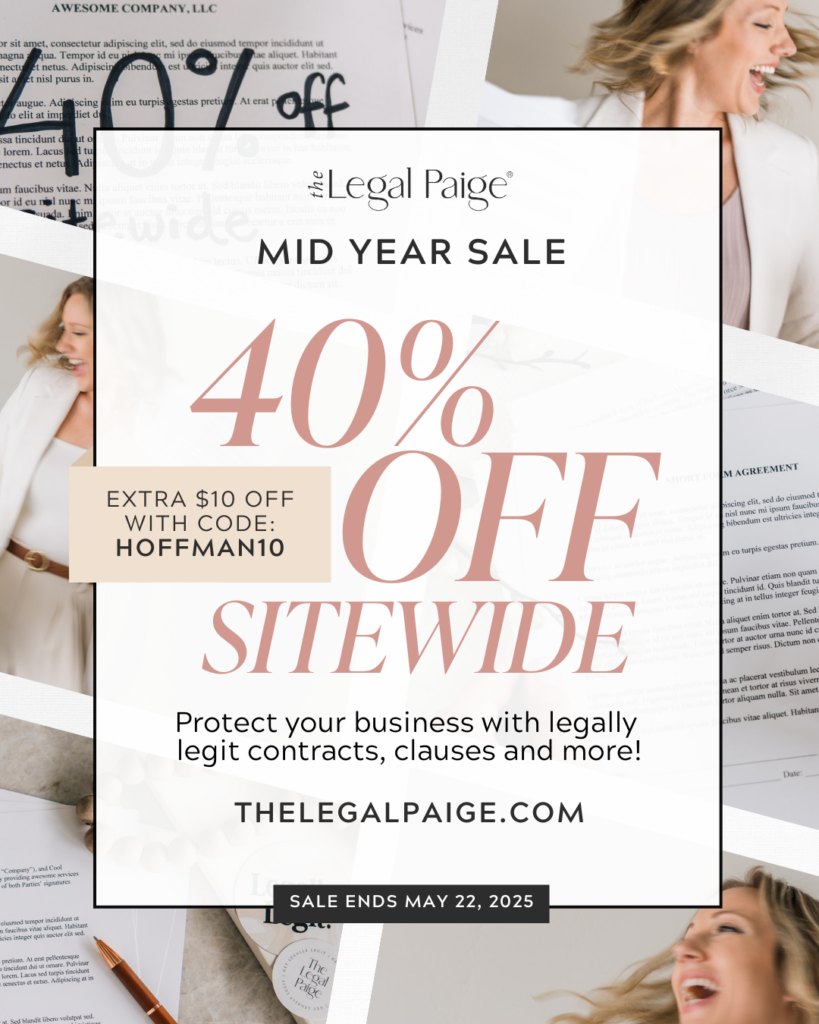Categories
i'm Maggie
Your average Canadian, who loves hot tea, hates socks and helping your business have a show-stopping brand and website
Branding
Design
Websites
About Maggie
The Must-Have Pages for Your Website (Yes, Even the Boring Legal Ones)
So you’ve got a business—or maybe a side hustle with big dreams—and you’re ready to launch your website. If you’ve DIY’d your website, then you’ve picked a great colour palette, written some killer copy, and chosen photos that actually look like you. Before you hit publish, let’s make sure your site has all the must-have pages—both the pretty ones and the legal ones. And if you’re working with a website designer, then be sure they are including these pages below, too!
Because yes, legal stuff might not be glamorous, but it’s absolutely essential—and easier to set up than you think.

Your First Impression | The Home Page
This is typically the first page people will visit, and it is where you welcome your visitors. You can use this page as a guide to encourage your visitiors to explore other pages by giving little snippets of what you offer, who you serve, and more about you. Be sure to use calls to action to other pages, so visitors can explore the site!
Get to Know You | The About Page
People want to know the person (or people) behind the brand. Share your story, values, and the “why” behind your business. Don’t be afraid to show some personality—this is your chance to build connection and trust. People buy from those they know, like, and trust. So make sure you add some photos of YOU or your team on this page. And they can be more personal too, so sometimes an iPhone photo can work on this page.
What You’re Selling | Serivces or Pricing Page
I’ve seen some websites not include a page of their services, or offerings, and it left me confused. Sure I know what your business is from your name “Joe’s Pest Control” (as an example here). But if Joe didn’t add what all he offers, I’m going to his competition and booking Pete’s Pest Control.
Tell your visitors exactly what you offer and how it benefits them!! Put their problem in the forefront and show how your services can solve it. Bonus points if you can answer common questions right on the page.
And yes, it’s okay to put your prices there—it saves everyone time. I am a HUGE advocate for adding pricing to your website, as it gives people an opportunity to “window shop” and find the best person for their budget.
Make your services and pricing easy to find, and easy to book.
Make It Easy to Reach You | Contact Page
Your contact page should include a form, email address, social links—whatever makes it easiest for someone to get in touch. You don’t want to lose a potential client because they couldn’t figure out how to reach you.
I also suggest adding business hours, or your response time. This is a nice little touch so your visitors know what to expect after they contact you.
Now Let’s Talk About the Legal Pages (Don’t Skip This!)
Legal pages might seem like an afterthought, but they’re critical for protecting you and building trust with your audience. These aren’t just formalities—they’re legally required in many cases, especially if you collect emails, use cookies, or sell anything online.
Privacy Policy
This one is non-negotiable if you collect any kind of personal data—like emails, names, or payment info. It tells your visitors how you collect, use, and protect their information—and it’s legally required in most countries.
Terms & Conditions
This page outlines how users can use your site, any limitations of liability, and your policies around things like refunds, cancellations, or disputes. It’s your first line of defense if someone tries to take legal action against you.
Cookie Policy & Pop-Up
If your site uses cookies—spoiler: it probably does—you need a cookie policy and a pop-up to let users know. This is especially important for compliance with GDPR and other privacy regulations.
How I make my sure my business is LEGALLY LEGIT

If all this legal stuff feels overwhelming, good news: Paige from The Legal Paige is running a Mid-Year Sale from May 19–22, 2025, and it’s the perfect time to grab her easy-to-use legal templates.
She’s a legit lawyer who specializes in templates made for online businesses, coaches, service providers, and creatives. Her contracts and policies are plug-and-play, so you can protect your business without hiring an expensive lawyer or Googling until midnight.
💸 Use my affiliate code HOFFMAN10 at checkout to save an extra $10 during the sale!
You’ll get peace of mind and a polished website that’s legally buttoned up.
Protect your Biz for Less
Whether you’re building a brand-new website or revamping an old one, make sure you’re not just focusing on design and copy. The pages that protect your business legally are just as important as the ones that sell your services.
With the right tools—and a little help from legal pros like Paige—getting legally legit is simpler than you think! If you need help with building your dream website, then reach out, I’d love to help you!